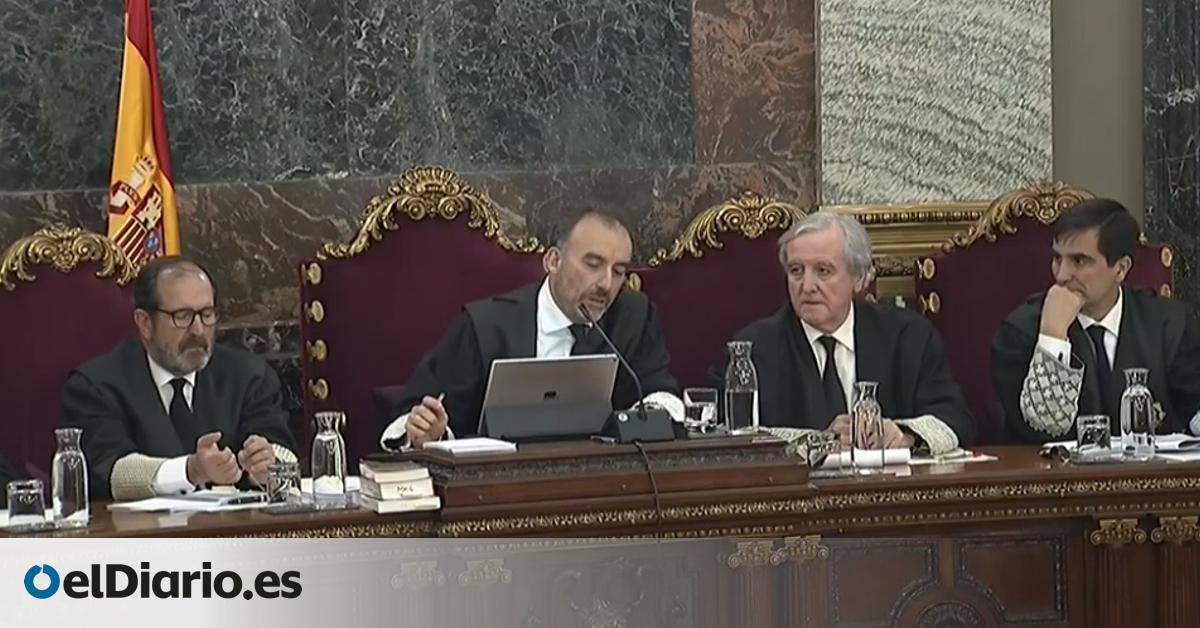
The Supreme Court has taken the step of having the Constitutional Court examine whether the amnesty is legal or not. The Criminal Chamber, made up of five judges, has presented a question of unconstitutionality in which they claim that the pardon for crimes linked to the independence movement breaks the equality between Spaniards. A ruling that also describes the 2017 sovereignty challenge as a “coup d’état” on a dozen occasions. The judges, who to justify the sentences for sedition stated that the referendum was “a decoy”, are now talking about a “secessionist coup d’état” when the objective is to take the law to the Constitutional Court, relying textually on arguments with which the Prosecutor’s Office unsuccessfully requested a sentence for rebellion.
The question of unconstitutionality has been signed by five judges of the Criminal Chamber of the Supreme Court. Three of them –Manuel Marchena, Antonio del Moral and Andrés Martínez Arrieta– also signed the sentence, in 2019. Carmen Lamela, the first to send Oriol Junqueras to prison in 2017, and the rapporteur Leopoldo Puente have completed the court in charge of putting in writing the accusations against the law approved in Congress last May.
The bulk of the document focuses on stating that the amnesty law overrides two rights enshrined in the Constitution: equality and legal security. Equality because, the Supreme Court states, “ostensibly privileged treatment” is given to separatists compared to someone who, they say, throws paving stones at the police but is protesting against an eviction and not the independence process. Legal security, they add, because it paves the way for another government of a different political persuasion to pardon more crimes until the criminal law is only applied to “fools and the poor.”
From there, the Supreme Court began using a term that it had never used before to refer to the procés. Something that the Prosecutor’s Office did use to promote its failed accusation of rebellion, but which the 2019 sentence did not mention: everything was a “secessionist coup d’état.” The Supreme Court, which in its sentence condemned Junqueras and the rest of the political leaders to sentences of up to 13 years in prison for sedition, embezzlement and disobedience, is now approaching the Prosecutor’s Office from which it distanced itself then.
The question of unconstitutionality explains what he means by coup d’état. He does not use the term, he explains, in “a strictly political sense” but based on Hans Kelsen: “The change of the Constitution without following its reform procedure.” But this is not an original argument of the Supreme Court in the case of the procés. The first to make this same quote from the Austrian philosopher was Javier Zaragoza in the trial of the procés itself. He is one of the prosecutors who has strongly opposed the application of the amnesty.
In July 2019, the Public Prosecutor’s Office made its request for imprisonment for rebellion for the leaders of the sovereignist challenge final. And Zaragoza, the most forceful speaker of the four prosecutors in the case, presented part of the final report of the Public Prosecutor’s Office. “What happened in Catalonia is what in Kelsen’s terminology is called a coup d’état, it was a coup d’état,” he said without hesitation.
Their arguments did not prosper in a ruling that devoted part of its pages to arguing that the defendants should be convicted of sedition, but not rebellion. It also highlighted the insistence of the secessionist strategy, but distanced its capacity and objectives from a coup d’état at that time. The violence used, the judges said, did not allow one to speak of rebellion. And the general power of the entire independence strategy – including the illegal referendum, the mobilizations, the processing of disconnection laws and the unilateral declaration of independence – was not sufficient to be a real threat.
Where now the Supreme Court agrees with the Public Prosecutor in seeing a “coup d’état”, then it spoke of “the absolute inadequacy of the set of acts planned and carried out to impose in fact the effective territorial independence and the repeal of the Spanish Constitution in the Catalan territory”. Its proven facts even explained that the real objective was not to separate Catalonia from the rest of Spain but to force the Government of Mariano Rajoy to sit down and negotiate a real referendum.
“They were aware that what was being offered to Catalan citizens as the legitimate exercise of the right to decide was nothing more than a decoy for a mobilisation that would never lead to the creation of a sovereign State,” said the Supreme Court in 2019. The true desire of the convicted Catalan leaders was “to put pressure on the Government of the Nation to negotiate a popular consultation.”
Amnesty before the Constitutional Court
In the 49 pages in which the amnesty is brought before the Constitutional Court, the Supreme Court toughens its discourse on the process, conceding in some lines that it was a “failed coup d’état”, not insufficient as it had considered until now. But where the sentence saw insufficient force to achieve its objectives, now this question of unconstitutionality speaks of how they tried to “alter by force of facts the democratic constitutional order”. Everything was the work, it adds, of “a coup-mongering collective” that tried to “alter the constitutional order to the point of proclaiming the secession of a part of the national territory”.
The law and its fundamental article are already in the hands of the Constitutional Court, which does not have a specific deadline to decide. The Prosecutor’s Office, for the moment, has formally supported the presentation of the question of unconstitutionality, although it will be later when the Public Prosecutor’s Office presents a complete report with its opinion on the law and its first article. A report that will have to be signed by the Attorney General of the State himself.
The question of unconstitutionality attacks the first article of the amnesty law, which is key to its development: it specifies which crimes can be amnestied. This issue has been applied for two months in courts across the country, which will now have to decide whether or not to go ahead with the amnesty while the court of guarantees makes a decision. According to the Public Prosecutor’s Office, there are 82 criminal proceedings in progress across the country with 486 people prosecuted, the majority in Catalan courts and tribunals.
The Supreme Court began the application of the amnesty with three pending proceedings: the main case already sentenced, the pending indictment of Carles Puigdemont in that branch and, finally, the accusation of terrorism against the former president by Tsunami Democràtic. To these has been added, in recent weeks, the aspect of the so-called ‘Russian plot’ of the procés recently sent to the Supreme Court by Judge Aguirre. The Tsunami Democràtic case was archived after the National Court found that an illegal extension of Manuel García Castellón prevented the case from going ahead.
In the other cases, the Supreme Court has established that crimes related to street disturbances are amnestied, although at the same time they question the substance of the law before the Constitutional Court. They have also established that the crime of embezzlement attributed, among others, to Puigdemont himself is not amnestiable. The procés – they say now after not mentioning it in the sentence either – not only compromised the Catalan economy, but also the economic interests of the European Union.
Source: www.eldiario.es

